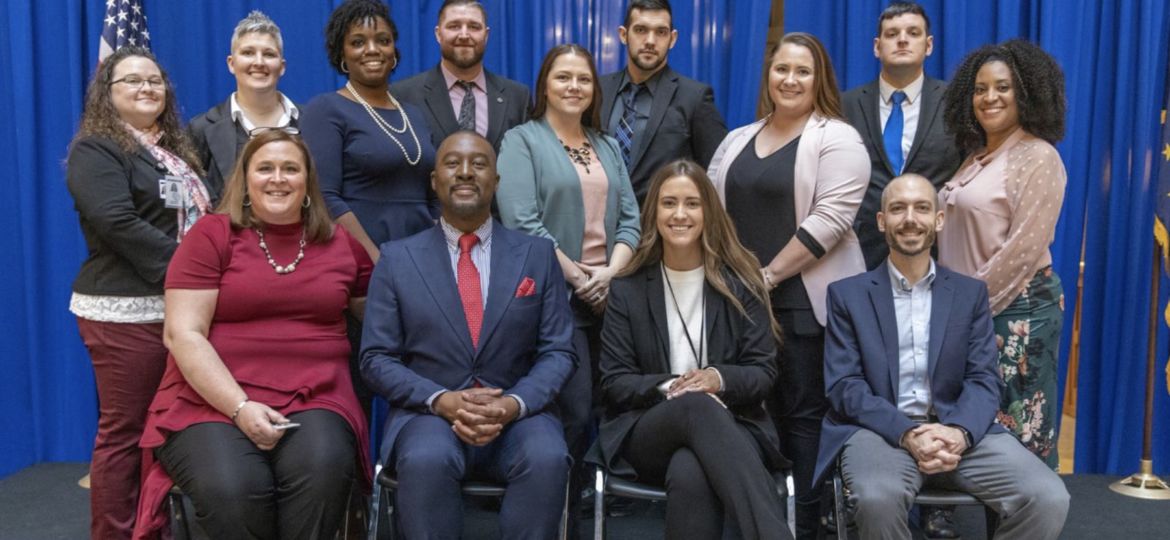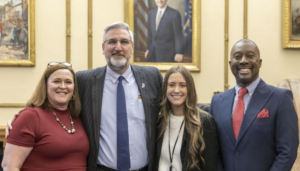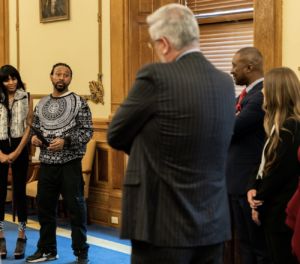
A person’s vocation can serve as a means to many ends — earning income, a sense of purpose, and even a way to fill the day. But what happens when an individual finds themself unemployed and with few options? Some of them turn to crime, their reasons varying greatly, but the statistics don’t lie: 85% of the 11,000 Hoosier inmates released annually were unemployed at the time of their arrest, indicating that a long-term solution to ex-offender employment may give hope to re-entering individuals and their families while infusing much-needed talent into the workforce.
When you’ve got a criminal record, it can feel like you’ve already lost. Many employment applications offer a boldface box for applicants to check if a criminal past is part of their profile. This reality check can leave ex-offenders dejected at the hurdle in front of them as they make attempts to earn a living, sometimes so much so that they return to crime in defeat. The cycle continues, and even individuals who are trying to put the past behind them can find themselves returning to old lifestyles. Fortunately, for the nearly 11,000 Hoosiers released from facilities annually, they’ve got a passionate group of advocates ready to support them as they transition back into public life.
ATTACKING A DEEPLY ROOTED PROBLEM WITH FRESH EYES
The team at the Indiana Department of Corrections HIRE program doesn’t think settling on the status quo is an option. In fact, their existence is dedicated to providing work opportunities and skills-building education to those exiting the justice system. More than a job placement initiative, the HIRE program, or Hoosier Initiative for Re-Entry, takes a multi-disciplinary approach toward solving the complex challenge of re-entering a society wary of ex-offenders and changing the statistics of recidivism.

“Our wheelhouse is helping clients with long-term, life sustainable careers. We also work with businesses across the state to help with their employment needs and help to create a community of barrier-busting entities that help our clients become beneficial members of society,” shares HIRE Director Carrie Heck.
This approach tackles two issues head-on: the client’s skills gaps and a lack of understanding, infrastructure, and support on the employer side. Typically, traditional employers willing to hire ex-offenders lack the tools needed to facilitate a successful employment relationship. In many cases, the work offered isn’t of the caliber that would allow an individual to earn a living wage, making a return to criminal activity more likely thanks to both lagging income and upward mobility.
GETTING BUY-IN THROUGH COMPASSION AND COMMON SENSE
Making the case for hiring a re-entering citizen to a potential employer can be challenging, especially when weighing the risks that can be interpreted when considering hiring an ex-offender, but that’s where the HIRE program is able to shine. Their structure helps prepare qualified clients for re-entry and collaborates with employers to help make the relationship successful for everyone involved.
“The HIRE Program’s Prerelease Employment structure enables businesses to solidify relationships with possible employees before they leave the facility. We also have a pool of eligible clients in our Parole Offices that are very qualified applicants that we can pre-screen for each business before any referral,” Carrie says.

While opening up employment opportunities to reentering citizens is the right thing to do, it can also offer businesses an advantage over their competition. In addition to being eligible for generous tax credits like the Work Opportunity Tax Credit and gaining access to the Federal Bonding Program, engaged employers gain access to one of the most valuable resources out there: human capital.
“It’s a worker’s market right now and our client base will open up an entirely new pool of clients for the workforce in each industry. We can help fill their employment needs with qualified applicants that are getting both college-level training and soft skills while in facilities to help them succeed prerelease,” shares Carrie.
By opening up to this untapped applicant pool, employers across the state can leverage the infrastructure the HIRE program has created to support clients and their employers as they embark on this partnership.
“The HIRE Coordinator remains in contact to case manage each client for a minimum of one year to make sure we are there for support. HIRE will create training for our businesses with tips for managing our client base successfully and how to keep their staff in a positive mind space about the work being completed.” Carrie explains.
A TRACK RECORD THAT INSPIRES
This investment in employers who are committed to the long-term success of their clients is well worth it. Since HIRE’s inception in 2012, more than 3,000 businesses have signed up to prepare for and welcome over 15,000 re-entering citizens as employees.
It’s important to note that the HIRE program isn’t simply a career placement service – their efforts help rebuild the clients’ confidence and provide them with tools, resources, and support to be successful once they’re on the job. Clients have gone on to accept careers at manufacturing facilities and in government agencies, while others have opened their own businesses. Success stories often recount the mental journey clients had to commit to before being able to make meaningful changes to their lives. These stories are shared within the correctional facilities as HIRE’s statewide coordinators engage with individuals with an interest in the programs. Coordinators work inside each of Indiana’s correctional facilities to identify, guide, and eventually place clients in potentially life-changing opportunities.
And HIRE’s efforts are working — clients who’ve completed the program not only begin sustainable employment with employers invested in their long-term success, but they’ve also earned wage increases of more than 40% since the program’s inception. Earning a livable wage through a supportive employment situation can result in clients staying engaged and committed. Only 14% of HIRE clients return to prison, which is less than half of the average statistic statewide.

“Our client base does not differ from any other client pool other than they have a blip in their history that they are actively working to diminish and leave behind,” says Carrie. “They are loyal. They are excited to have an opportunity. They want to give back to the employers that give them a chance. The clients that work with the HIRE Program are working while in facilities and are getting certification and training that would give them a better chance to succeed than a lot of the current employment pool candidates we are seeing across the State of Indiana.”
The HIRE program recently celebrated its tenth anniversary in February 2022 and its passionate team shows no signs of stopping its efforts to help Hoosiers in both adult and juvenile facilities. Their aims surpass the metric-heavy datasets that prove that their approach is working — they want communities to welcome their clients home with open arms.
“Most citizens in Indiana have a relative or friend that has had a past indiscretion with the legal system that they care about,” Carries says, adding, “If any local citizen keeps that in mind when they communicate or interact with our client base, and treat them like they would their family or loved ones, our client base would have a better shot at success in any small town or large metropolitan area in our state.”
If you’re an employer who’s interested in hiring one of the well-prepared and qualified candidates the HIRE program works with, reach out to their office to start a conversation.
Natalie Derrickson is a communications professional, strategist, and writer. You can connect with her on Instagram, Twitter, LinkedIn, and her website.
All of our content—including this article—is completely free. However, we’d love if you would please consider supporting our journalism with an Indy Maven membership.









